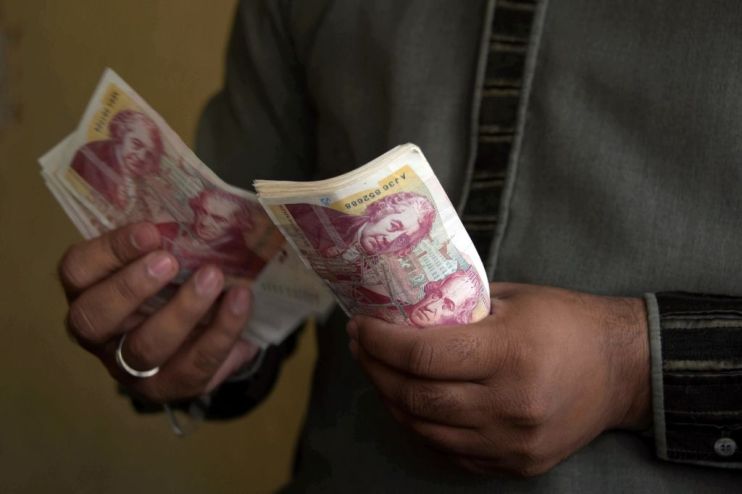Coronavirus: Britain must make remittances easier – for everybody’s sake

Coronavirus is a multitude of crises, at home and overseas. Here in the UK it’s been nothing short of remarkable how the machinery of government has dealt with the COVID-19.
There is incredible pressure on our NHS and care sector. With the help of the British people respecting the lockdown, it has stood firm. Our economy has been paused, but with the furlough scheme in place, hundreds of thousands of jobs have been saved. Our schools closed, but parents are filling in – and with a full appreciation for the patience of their little darlings’ teachers. And while our high streets are shut, firms are innovating to support our national PPE and ventilator effort. We should be proud.
But below the surface are more problems which reach from UK homes far overseas.
Read more: City A.M. campaigns to Save Our SMEs
Our commitment to Africa is visible in many ways. Last month G20 Trade Ministers met virtually, initiated by UK Trade Secretary Liz Truss. They agreed to do everything possible to keep trade flowing. In 2019, the UK imported goods worth £12.7bn from Africa and Africa received £2.4bn of DFID aid, – 56.4% of total UK direct international aid.
But it’s at the individual level where the spotlight needs to shine, and urgently. Hundreds of thousands of people in the UK regularly send money overseas to their families. Remittance services are used to send billions of pounds a year and much of it is deposited in cash. The lockdown has meant deposits have collapsed by up to 60 per cent – partly because fewer people have money to send but crucially because they have lost the main means to get money into the system.
With most shops closed, many of the places where people deposited much-needed funds have also shut. Even where they are open, there are long queues and people are understandably reluctant to handle cash for fear of catching the virus.
The importance of this cannot be understated – £64billion was sent to African nations in 2018, far more than foreign aid. Cutting off the funding means an economic and humanitarian crisis in places least able to afford it.
The problem is exacerbated as banks, already reluctant to take on the often-misplaced perceived risks of money transfer companies, have effectively closed their doors to discussions for new accounts or expanding relationships to offer digital services.
Families in Somali refugee camps rely on this money to buy food or to secure their children even a basic education. In Kenya, people use the cash to pay rent. Millions of people in Africa are dependent on receiving money from abroad. And many hard-working migrants in the UK, in constituencies such as mine in Milton Keynes, are growing anxious with concern for their loved ones.
As well as a looming humanitarian crisis, it creates a real security threat. If people, such as those in Somalia, stop getting remittances, they have precious few other options. Intelligence officials and humanitarian agencies have reported that when money from family abroad stops coming in, communities can fall into the hands of terror groups like Al Shabaab who step in as a money lender of last resort. Poverty and economic uncertainty are breeding grounds for terrorism. Indeed as far back as 2010, al-Shabab declared international remittances to be “unIslamic”. They prey on the desperation financial isolation brings. This creates a threat not just for Africa, but for the UK. Keeping remittances going will play a key role in fighting these threats.
What can be done? First and foremost a UK bank can stand up and help. Nothing in our current banking laws or regulations prevent money transfer companies from holding a UK account. Under the Payment Services Regulations 2017, banks are obliged to undertake proportionate risk assessments of new customers and rightly refuse services to firms which do not follow the rules while offering services to those that do.
But they can also reject applications without explaining their reasons. It means firms which follow regulatory requirements and anti-money laundering rules are left out in the cold by anxious banks.
It doesn’t have to be like this. A major bank, perhaps with a large public ownership like RBS, could step up at least as an emergency measure. Giving money transfer companies access to a bank account with digital services would reopen flows of money to many who badly need it for their basic survival and ease the stress of their families here in the UK.
In the medium term, the Government can also help. The Treasury, Home Office and the Department for International Development should work together. Tweaking rules to ensure remittance services are entitled to basic UK banking services would shift the burden of proof to the banks to show good reasons why an account should be blocked.
It is impossible to know how long this crisis will last or how it will end. I’m proud of how the Government and the banks have moved so swiftly in the face of this unprecedented threat.
We must keep responding. Money transfer services face a clear problem in this crisis, one that if we do not fix will lead to a humanitarian disaster and strengthen the hand of terrorists. But, there’s a solution – one on which the UK can rightly and proudly lead the world.